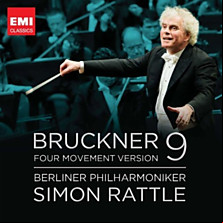BBC Review 1bj6o
Rattle’s new finale is a resounding success, full of boundary-pushing harmonies.
Graham Rogers 2012
At a time when completions of Mahler's 10th and Elgar's 3rd have become part of the symphonic mainstream, it’s surprising that Bruckner's 9th is generally regarded as a three-movement torso – especially since more of Bruckner's own material exists for the final, uncompleted, movement than that left behind by Mahler or Elgar for their final symphonies.
But, like Schubert's “Unfinished”, the movements that Bruckner completed were able to be published as a work in its own right. That the epic Adagio of Bruckner's 9th came to be seen, mistakenly, as the composer's “farewell to life” reinforced the erroneous idea that this is the symphony's true ending. Yet Bruckner intended the work to have a grand final movement, which he died working on.
And that is exactly what Simon Rattle provides in this performance – a finale newly reconstructed by a team of four musicologists. As detailed notes explain, of the finale's 650-odd bars, nearly 600 are either written in full score by Bruckner or can be clearly reconstructed from his extensive sketches. Only 28 bars had to be newly composed, using material that was already there.
The score can therefore safely claim to be authentic Bruckner, and Rattle's conviction that it “feels absolutely right” is borne out in this superb with the Berlin Philharmonic. Any lingering suspicion that restoring the finale is merely an academic exercise is dispelled by their powerful advocacy.
Recorded with impressive immediacy in Berlin's sumptuous Philharmonie, the performance as a whole is utterly compelling. Rattle fully engages with the gripping drama of Bruckner's music. The first movement combines intense power, cataclysmic terror and exquisite tenderness, Rattle never wallowing in the beautiful soundworld but underpinning the vast architecture with purposeful drive. The scherzo has a chilling air of unstoppable menace, the Adagio's heart imbued with searing anguish.
Emerging from its concluding serenity, the 23-minute finale reveals itself as a thing of overwhelming grandeur, laden with spine-tingling, boundary-pushing harmonies. The climax is thrillingly majestic – the truly triumphant ending that Bruckner wanted. Rattle proves emphatically that there should be no more excuses for depriving the work of its resounding finale.



